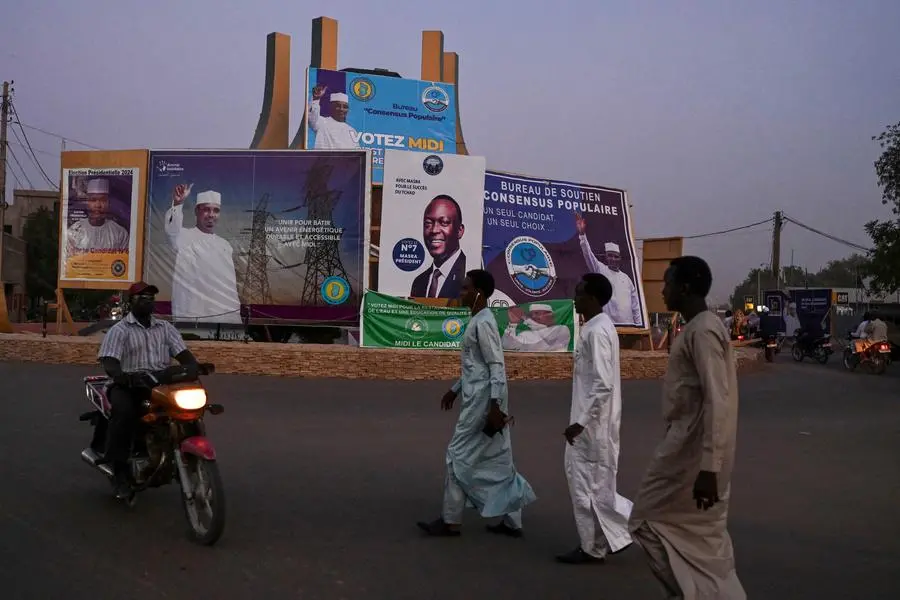PHOTO
Chad will hold presidential elections on Monday, making it the first in a string of coup-hit states across Central and West Africa to use the ballot box to try to emerge from years of military rule.
Opposition groups have already cried foul. The candidate widely expected to win is Mahamat Idriss Deby - the man who seized power the day rebels shot and killed his long-ruling father, Idriss Deby, in April 2021.
But Chad's Western allies have largely stayed quiet and kept watch - hoping, analysts say, that at the very least, the vote will deliver a relatively stable state in a region hit by militant violence where Russia is also pushing for influence.
Among those Western countries is Chad's former colonial ruler France which still has war planes and 1,000 troops there, most recently helping Chad and its neighbours combat the Islamist fighters of Boko Haram.
Chad is now the last Sahel country with a substantial French military presence after other junta-led states including neighbouring Niger as well as Burkina Faso and Mali, told Paris and other Western powers to remove their troops and turned to Moscow for backing.
The priorities of regional and Western powers will be to push for stability and shore up their positions in the country, analysts say.
"Chad is just too strategic at the moment for the West to allow Russia to get an opening," Ulf Laessing, head of the Sahel programme at the Konrad Adenauer Foundation, said.
It is not just strategic in terms of security, but also on the hot-button issue of migration.
Chad has accepted a huge influx of refugees from Sudan, where civil war has created the world's largest displacement crisis. Laessing said some refugees have crossed to Niger, which last year repealed a law aimed at slowing migration to Europe.
"It's another reason for Western countries to keep the relationship with Chad despite the dismal human rights record," he added.
An election win would bolster Deby's credentials as an ally. "Western policy makers can say at least he was elected," Laessing said.
There are fears the turmoil could be testing old ties in the oil-producing country that lies next to the war-torn states of Sudan, Libya and Central African Republic and the economic powerhouse of Nigeria.
Mahamat Idriss Deby, who took on the title of interim president after his takeover, met French President Emmanuel Macron in Paris in October last year. He also met Russian President Vladimir Putin in Moscow in January.
In April, Chad's air force chief ordered the U.S. to halt activities at an air base near the capital N'Djamena, saying there was a problem with their paperwork.
Weeks later, the U.S. announced a temporary withdrawal of at least some of its troops and said it would continue with a review of security operations after the vote.
PROTESTS, RIVALS, VIOLENCE
Concerns about human rights have also mounted since the younger Deby's takeover.
He initially promised an 18-month transition after his father's death, but his government later adopted resolutions that postponed elections and allowed him to run for president.
The delay triggered protests that security forces violently quelled, killing around 50 civilians.
Opposition figure Yaya Dillo was shot and killed in N'Djamena on Feb. 28, the day the election date was announced. The opposition has called Dillo's death an assassination and forensic experts have said he was likely shot at point-blank range.
Chadian authorities said he was killed during an exchange of fire with security forces who had been sent to detain him for alleged involvement in clashes.
One of Deby's most prominent challengers on Monday will be Succes Masra - a political opponent who spent a year in exile from 2022-2023, then shocked Chadians by agreeing to become Deby's prime minister.
He will also be running against former prime minister Albert Pahimi Padacke and seven other candidates, including Lydie Beassemda, the only woman going for the top job.
"Masra's decision ... was a bit surprising, because, during the demonstrations and the deaths, people were saying they wanted change and they saw Succes Masra as the face of change," Babacar Ndiaye, research director at think tank WATHI, said.
Some opposition parties and civil society groups have called for a boycott of the vote, saying Deby and his allies control the main institutions of power and could influence the process.
"This is an election to consecrate the reign of the current leader of the transition," Abderramane Goussoumian, head of the civil society network CSAPR, said.
But for Abakar Moussa Seid, a member of the opposition National Rally for Democracy in Chad party, a boycott would amount to a surrender.
"The only democratic way to end the perpetuation of the power of the Deby dynasty is through the ballot box," he said. (Editing by Bate Felix and Andrew Heavens)




















